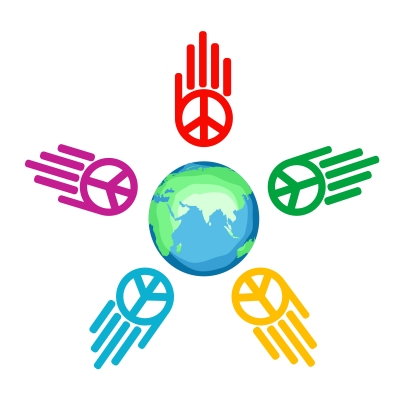Saturday, September 21st was the International Day of Peace. I celebrated it with a group of like-minded folks who gathered at The First Parish Church in Concord, Massachusetts.
It was a lovely event and it felt good to be there. It felt good to know that across the U.S. and around the world, other like-minded people were getting together to celebrate a day dedicated to peace. And yet...
And yet, throughout the U.S. and across the globe, violence continues, and I have to ask myself, after all these years, is the Day of Peace making a difference? I want to believe it is. As a matter of fact, I do believe it is a making a difference, but not enough of a difference.
Yes, there are celebrations of Peace Day around the world, and these celebrations are increasing in number. This is, of course, a good thing. I know it matters and I know that the more of us who have peace in our hearts, the more peaceful the world becomes. And yet...
And yet, after more than 30 years of Peace Day, the geo-political climate is not one of peace. Or is it? Various studies and statistics tell us that the world is more peaceful than it has ever been. (I include links to these studies at the end of this blog post.) This is encouraging news and it makes me feel that working for peace and celebrating peace is working to a certain degree. It gives those of us who believe world peace is actually possible encouragement to keep believing and to keep working for peace. Most importantly, it shows that the paradigm is shifting away from violence and oppression as the way to resolve conflict. And yet...
And yet, this shift is slow and tentative and easily disrupted. The sad and alarming fact is that the world is less peaceful now than it was five years ago. 110 countries are more violent now than they were in 2008. This fact should really concern all of us because it shows that a trend towards peace and non-violence is easily disrupted. The causes are varied and often reflect the desire of people to have better lives - lives that are characterized by
more freedom,
racial/ethnic, religious and gender equality
secure access to the basic necessities of life, including enough food, a source of income, medical care, and education.
No one can fault people for these desires. And yet...
And yet, it is imperative that we learn how to achieve these goals without violence. This should truly be a primary goal of every country, every government and every person in the 21st century. Recently the world has seen diplomacy prevent the U.S. from dropping missiles in Syria. To those of us who believe in negotiation this is a gratifying testimony to the power of non-violent conflict resolution. And yet...
And yet, the road before us is long and hard. To truly change the paradigm away from war and violence we must work at every level and in every way. We must work on the individual level and the local level. We must work to influence governments to seek peaceful solutions. We must use politics and churches, schools, universities, non-governmental organizations, media, music and literature to change the global consciousness away from war, revenge and retribution. In order to do this, we must also make it our work to ensure that people everywhere have access to the basic necessities of life. This is a tall order. And yet...
And yet, what if we diverted all of the money, brain power and resources that we use to create weapons and military power to finding ways to ensure that all people have basic human rights? How different would our world be by the end of the 21st century? I would like to find out. So, as we learn that the world is becoming more violent again, we must not let go of our belief in peaceful solutions. We must work with more love in our hearts; with more determination to wage peace instead of war; we must not only want peace, we must learn to be peace. And we must never, ever let ourselves lose hope.
http://www.policymic.com/articles/47609/5-signs-that-the-world-is-becoming-a-more-peaceful-place
http://www.salon.com/2013/04/23/the_world_is_actually_safer_than_ever/
http://www.reuters.com/article/2012/06/12/us-world-peace-idUSBRE85B05C20120612
http://www.dalailama.com/messages/world-peace/a-human-approach-to-peace
http://www.sciencedaily.com/releases/2012/11/121119093846.htm
http://www.cbsnews.com/8301-201_162-57588747/world-is-a-less-peaceful-place-in-2013-study/
The next morning my mother told us that we must pray for our father and all the good men that had been taken by the enemy. We must pray for our men to be safe and to defeat the enemy. We must pray for God to wreak vengeance on our enemy.
“What does vengeance mean?” my brother asked when were finished praying. My mother, who I had always known as gentle and kind, replied, "Vengeance means doing worse to them than they do to us. If they kill our men, we must kill their men and their children. We must leave them with nothing. Not even hope.”
My brother looked confused. “If God wreaks vengeance on them for killing our men, will our men come back to life?”
“No, they will still be dead, but their deaths won’t be in vain. God will take more lives from them, than He takes from us and that will mean we have won the war.” When I heard these words, I knew that my mother had already lost hope. She would never ask God to kill anyone if she wasn’t overcome with grief and fear.
My brother sat silent for a few seconds, and then he said, “I guess I don’t understand war. What good does it do to kill everyone?” (from I Call Myself Earth Girl, chapter 2.)

